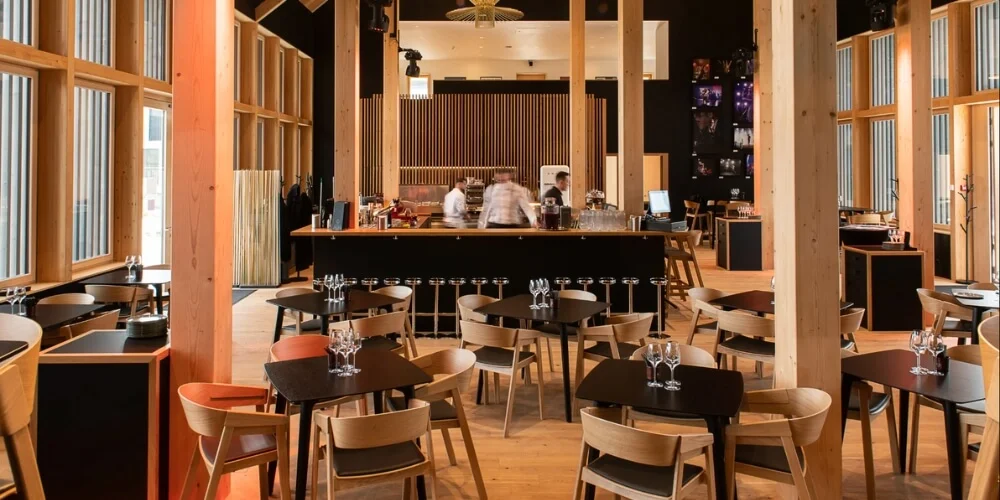Top 5 Hospitality Management Courses and Schools to Boost Your Career Prospects
Embarking on a career in hospitality not only promises intrinsic rewards but also opens doors to a global stage where you can craft extraordinary experiences for diverse travellers. Beyond the realm of guest service, it offers pathways into realms such as real estate, leadership, and finance, all intricately tied to the dynamic hotel industry.
In this blog, we delve into the world of hospitality management courses, shedding light on the premier hotel schools and courses that serve as launching pads for your career journey. With these leading courses, you’ll develop the skills required to run a hotel and manage a hospitality business.
From exploring the crème de la crème of educational institutions to understanding why a hospitality manager course is an invaluable investment, we aim to guide you through the avenues that can elevate your career prospects.
The Best Hotel Schools Worldwide
The first step in undertaking hospitality management courses is finding the right school for you. These institutions not only offer rigorous academic programs but also provide immersive experiences that shape well-rounded professionals.
These are some of the best internationally acclaimed hotel schools that are well worth investigating for both their on-campus and online course offerings. These schools offer a variety of courses available in full-time, part-time, and online modes, so it’s important to do your research to find something that would suit your lifestyle and budget.

Credit: Ecole Hoteliere de Lausanne
Ecole Hoteliere de Lausanne (EHL), Switzerland
Considered to be the best hospitality management school worldwide, Ecole Hoteliere de Lausanne (EHL) had to be at the top of our list. This prestigious school is consistently ranked number one by QS World University Rankings for Hospitality and Leisure Management.
EHL has been a pioneer in hospitality management education since 1893. The school offers exceptional hospitality management courses and degree programs, with units of study in both Switzerland and Singapore, giving you that truly international experience and a launching pad of opportunities.
Cornell University, New York – School of Hotel Administration (SHA)
Cornell University’s School of Hotel Administration (SHA) is based out of the Johnson Business School (Nolan), one of the top business schools in the world. Founded in 1922, it was the world’s first four-year intercollegiate school devoted to hospitality management.
Offering undergraduate, graduate, and executive education programs, they have by far the most extensive hospitality course selections available. The courses are offered in a residential format, online, or a combination of both, providing great flexibility for students. Cornell also offers an MBA and residential programs to complement your learning journey.
SHA also offers a program in collaboration with Peking University Shanghai, giving students opportunities to learn in a dual language environment and exposure to 30% of classes being held in Ithaca and New York.
Oxford School of Hospitality Management
Known for its strong focus on research and its close ties with the hospitality industry, the Oxford School of Hospitality Management offers undergraduate and postgraduate studies in Tourism, Event Management, and Hospitality.
The school is closely linked to the Oxford Brookes Business School, offering complementary courses that can enhance a hospitality manager course.
Compulsory practical placement complements each of the courses and close connections to the luxury hotel portfolio in London means a strong foundation for future career paths.
Hotelschool The Hague, the Netherlands
Hotelschool The Hague has a strong emphasis on practical experience as well as academic learning. You’ll discover a range of study options including a fast-track degree program if you have previous studies under your belt.
At The Hague, it’s compulsory to live on campus for the first year. This builds a strong community-focused educational environment and forms the basis for the strong alumni for the future.
There is an onsite hotel, restaurant, and café to gain valuable experience from the beginning of your learning journey.
The Blue Mountains International Hotel Management School
As Australia’s leading hotel management university, the Blue Mountains International Hotel Management School run through Torrens University offers international tourism, hospitality, and hotel management courses and degrees.
A variety of scholarships are available for eligible students, and the faculty is very well connected with the global hotel companies in Australia to assist with compulsory industry placements.
Just like its European counterparts, The Blue Mountains School boasts a strong alumni that further proves its position among the top international hospitality management institutions. This is by far the most well-recognised dedicated hotel school in Australia and offers long-term career prospects for its graduates
Hospitality Courses at Australian Universities
In addition to the Blue Mountains International Hotel Management School, most Australian universities offer areas of study for entry into the hotel industry. But what course is hospitality management, and what should you look for when choosing a university?
Degrees in International Tourism and Hotel Management are the way to go. Griffith University has a very well-regarded Department of Tourism, Sport, and Hotel Management that’s well worth consideration.
Other institutions and courses to consider include:
- The University of Queensland’s Tourism, Hospitality, and Event Management courses
- James Cook University’s Tourism, Hospitality, and Events programs
- Victoria University’s Tourism and Hospitality Management major
- The University of Wollongong’s Advanced Diploma of Hospitality Management
- Southern Cross University’s Tourism and Hospitality Management courses
- Bond University’s Bachelor of International Hotel and Tourism Management
Additional Areas of Study to Consider
Outside of specific hospitality management courses, you don’t just have to undertake a specific course in hospitality to enter the exciting world of hotels. Specialised degrees in Finance, Economics, and Marketing all offer excellent groundwork for a career across a multitude of roles within the industry.
Specialised degrees also give you an alternative career path to more conservative mainstream roles across accounting firms, consulting, and agencies. Joining the hospitality industry gives you exposure to a much broader spectrum of work functions and opportunities. These careers exist in standalone hotels, global hotel companies, and corporate and regional offices.
If you have already embarked on your career in the hospitality industry and would like to further expand your career prospects, including management and leadership skills, we recommend that you look at an MBA course to solidify your management and leadership skills.
If you’re a senior leader, department head, functional leader, or newly promoted manager, we would recommend you complete studies around the following areas. These will give you valuable knowledge to ensure you have an all-round skill set in hospitality management.
Strategic Hospitality Management for Long-Term Value Creation
Strategic management in hospitality involves making decisions and taking action to gain a competitive advantage and achieve organisational goals.
This course would cover topics such as strategic planning, competitive analysis, resource allocation, and performance measurement. It would also delve into the importance of innovation and change management in maintaining long-term value.
Revenue Management and Pricing for Increased Profitability
This course would focus on the principles of revenue management and pricing strategies in the hospitality industry. Topics would include demand forecasting, dynamic pricing, yield management, and distribution channel management.
The goal is to maximise revenue and profitability while maintaining high levels of customer satisfaction.
Guest Experience Management for Loyalty and Career Growth
In this course, students would learn about the importance of providing exceptional guest experiences. Topics would include service quality management, customer relationship management (CRM), customer experience management (CEM), loyalty programs, and handling customer complaints.
The course would also cover how delivering excellent guest experiences can lead to career growth in the hospitality industry.
Hospitality Financial Management for Effective Budgeting
This course would provide students with an understanding of financial management principles relevant to the hospitality industry. Topics would include budgeting, cost control, financial analysis, capital budgeting, and investment decision-making.
The aim is to equip students with the skills needed to make informed financial decisions and effectively manage a hospitality business’s finances.
Leading Hospitality Teams for Managerial Excellence
This course would focus on leadership and team management in the hospitality industry. Students would learn about different leadership styles, team dynamics, conflict resolution, and motivation strategies.
The course would also cover human resource management topics such as recruitment, training, performance appraisal, and employee retention.

Traineeships After Graduation
Most major global companies also offer corporate traineeship programs across a spectrum of positions in the hotel. Students normally gain access to these after they have completed their bachelor’s degree.
Keep this in mind as a stepping stone into a mid-level management position that may give you excellent exposure to departments within the hotel that you may not otherwise have experienced.
Speak to Axsia HTL for Industry Insights
Hospitality is one of the most resilient and adaptable industries to sink your teeth into. By studying for a bachelor’s degree in Hotel Management or an equivalent specialised area, you will learn valuable skills that will set the foundation for an exciting career path and can be transferred into a variety of industries.
If you’re interested in learning more about how to enter into the dynamic and exciting world of hospitality, feel free to get in touch with us at Axsia HTL for expert insights.






